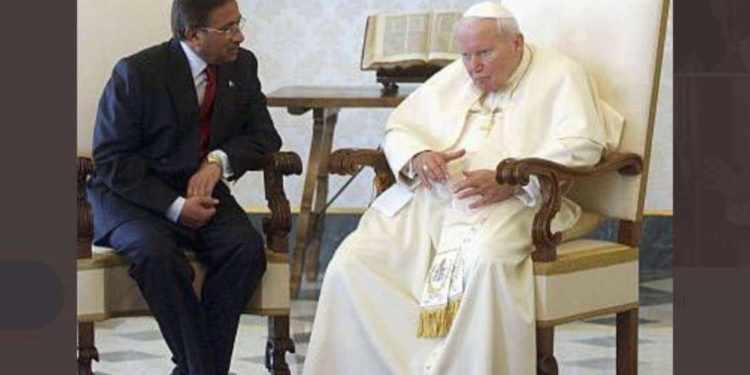The military ruler headed the South Asian nation during the ‘war on terror’ by the US in the aftermath of 9/11 attacks
St Pope John Paul II with General Pervez Musharraf during a meeting in the Vatican City on Sept. 30, 2004. (Photo: file)
Catholics in Pakistan paid tribute to the military ruler who headed the South Asian Islamic nation during the global war on terror, initiated by the United States in the aftermath of the 9/11 attacks.
General Pervez Musharraf, former president of Pakistan, governed the strife-torn country for nearly a decade after seizing power in a bloodless coup in 1999. General Musharraf died in Dubai on Feb. 5 at the age of 79.
Father Inayat Barnard, the chaplain of Caritas Pakistan, remembered General Musharraf as a great statesman.


He showed the courage to make Pakistan terrorism-free. For him, the genuine slogan was “Pakistan First,” Father Barnard said.
“The corruption-free president will be remembered forever. May his soul rest in peace,” the priest observed.
The newly installed Bishop Yousaf Sohan of Multan remembered the late president for supporting vulnerable religious minorities.
“It’s a huge shock. We remember him for his services,” he told UCA News.
General Musharraf was born in India’s national capital Delhi on Aug. 11, 1943.
At the age of four, he joined his family and millions of other Muslims to migrate to Pakistan following the partition of India in 1947 after the British ended their rule in the subcontinent.
He attended the Catholic Church-run St. Patrick’s School in Karachi and Presbyterian-run Forman’s Christian College (FCC) in Lahore before entering the Pakistan Military Academy in 1961.
The college was nationalized in 1972 along with a number of other Church-run schools and colleges, a move that weakened Church-run institutions and created fear among Christians.
In 2004, Musharraf ordered the conditional privatization of minority educational institutions. As a result, 59 institutions, including more than 10 schools in the southern Karachi archdiocese, were returned to the Church.
He also granted university status to FCC, which was established by the American Presbyterian Church as Mission College in 1894.
The new status allowed the college to confer its own master’s degree certificates. FCC became the first Christian college to gain this status.
Musharraf faced fierce criticism from radical clerics for an attack on the controversial Lal Masjid (Red Mosque) that killed 103 people in 2007.
The jihadist outfit Taliban holds him responsible for the large-scale bloodshed that followed his decision to side with the US war on terror.
Musharraf, who survived numerous assassination attempts, angered Islamic militants by dropping support for Afghanistan’s Taliban regime and by arresting hundreds of al Qaeda members in the country.
He also hit hard against domestic militant groups, while fostering ties with India, with which Pakistan has fought two full-fledged wars.
Though the democratic rule was suspended after the coup, he did restore the joint electorate system in 2002, enabling Muslims and religious minorities to run and vote for general seats.
Previously, minority communities could vote only for members of their own groups to fill the reserved seats. He also allowed private news channels to operate in the country for the first time.
Latest News
Credit: Source link




